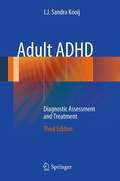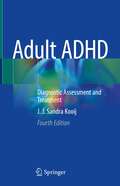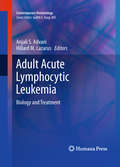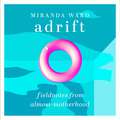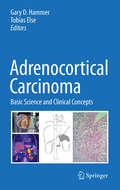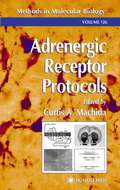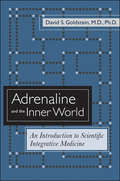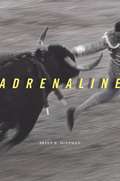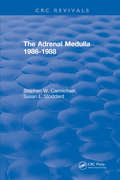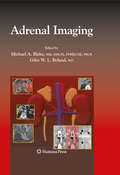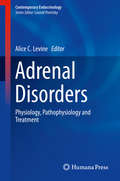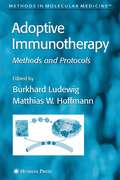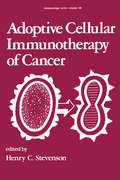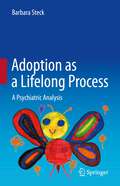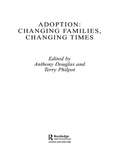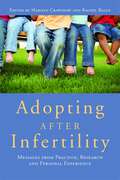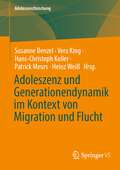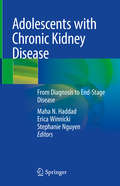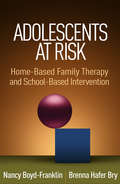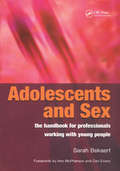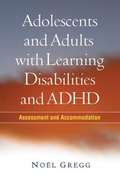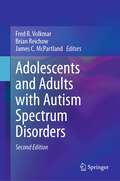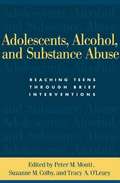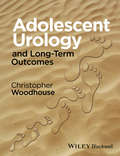- Table View
- List View
Adult ADHD: Diagnostic Assessment and Treatment
by J.J. Sandra KooijAdult ADHD: Diagnostic Assessment and Treatment, Third Edition covers not only diagnostic assessment, but also comorbidity patterns as well as differential diagnosis of ADHD with for example bipolar disorder and borderline personality disorder. The symptom overlap and misdiagnosis of chronic fatigue syndrome in girls and women with the inattentive subtype of ADHD, ADD is explored. The chronic delayed sleep phase syndrome associated with ADHD based on disturbances in the circadian rhythm, and the possible consequences for general health (obesity, diabetes, cardiovascular diseases and cancer) are discussed. There are sections on ADHD and intelligence, criminality, sexuality, dyslexia and autism. Adult ADHD can be treated effectively but as yet the disorder is not always recognised by professionals and this book aims to help correct this. Diagnostic tools are included, such as the structured Diagnostic Interview for Adult ADHD (DIVA), and an ultra-short and somewhat longer screening tool, all based on the DSM-IV criteria for ADHD. Treatment options cover psychoeducation and motivation and individual and group coaching; long-acting stimulants and other new drugs for treating ADHD; use of melatonin to treat the delayed sleep-phase disorder. Useful information is included on the setting up and organisation of a department for adult ADHD with a multidisciplinary team. References, websites and useful international addresses have all been updated. Adult ADHD: Diagnostic Assessment and Treatment, Third Edition is intended for students, junior doctors/residents, psychologists, psychiatrists, other mental healthcare professionals and interested parties and provides a quick overview of the current state of the science and of the methods used in diagnosis and treatment. Adult ADHD: Diagnostic Assessment and Treatment, Third Edition was originally published by Pearson Assessment and Information BV, The Netherlands.
Adult ADHD: Diagnostic Assessment and Treatment
by J. J. KooijThis updated volume provides a clinical based overview of the assessment and treatment of ADHD in adults by a clinical researcher with extensive experience. Its practical focus allows each chapter to answer common questions encountered within clinical practice. Differential diagnosis of ADHD is also discussed in relation to comorbidity with bipolar disorder, borderline personality disorder, chronic fatigue syndrome, and chronic delayed sleep phase. Adult ADHD: Diagnostic Assessment and Treatment, fourth edition aims to help readers identify ADHD effectively and put in place suitable treatments. The book is relevant for psychiatrists, neurologists, and healthcare professionals involved in the diagnosis and treatment of adult ADHD.
Adult Acute Lymphocytic Leukemia: Biology and Treatment (Contemporary Hematology)
by Hillard M. Lazarus Anjali S. AdvaniThe current explosion of new areas of controversy in the treatment of acute lymphocytic leukemia in adults and young adults makes this comprehensive book a much needed reference for hematologists and oncologists. This book assembles leading authorities from around the globe to cover the full spectrum of ALL subtypes and their treatments. Specific topics of discussion include indications for allogeneic bone marrow transplant in first complete remission, the role of minimal residual disease in making treatment decisions, the treatment of young adults, and the treatment of Philadelphia chromosome positive ALL with the advent of the tyrosine kinase inhibitors. This is the first book to focus exclusively on the adult ALL patient. It provides a complete overview of diagnosis, molecular pathogenesis, evaluation, and treatment for this important patient population.
Adrift: Fieldnotes from Almost-Motherhood
by Miranda Ward'What would it mean to name this place I'm in, to map it? To say: this is the landscape. It looks like this, smells like this, at night these are the sounds that carry on the wind. Almost-motherhood . . .'When Miranda Ward and her husband decided to have a baby, they were young and optimistic. But five years, three miscarriages and one ectopic pregnancy later, she is still dealing with the ongoing aftermath of that decision, and the shadow it's cast over her relationship to her partner, her body and her future. In this searing, lyrical and radically honest memoir, Ward charts her journey through the uncertain landscape of almost-motherhood, asking questions of geography on the most intimate scale. How can we learn to be at home in our own bodies, even when we feel adrift from them? What language do we have for the spaces in between, the periods of wanting and waiting? And how do we maintain hope as we navigate towards an unknown future?
Adrenocortical Carcinoma: Basic Science and Clinical Concepts
by Gary D. Hammer Tobias ElseWe anticipate the book to be a definitive text on the subject that explores all aspects of the study of adrenal cancer and the treatment of patients with the disease. Chapters will cover epidemiology, pathogenesis, genetics, cancer stem cells, historic and emerging therapies, mouse models of adrenal cancer, new developments in tumor profiling, worldwide collaborative groups and tumor registries together with resources for the practitioner and community of adrenal cancer scientists. We do not wish this book to compete with the other larger books in the Endocrine and Endocrine Surgery literature. In addition, it is not expected to cover benign adrenal diseases that have been covered in detail in other venues. We envision this book to be a very specialized and exhaustive text on basic, translational and clinical aspects of adrenal cancer.
Adrenergic Receptor Protocols (Methods in Molecular Biology #126)
by Curtis A. MachidaCurtis Machida and a panel of expert investigators present a comprehensive collection of modern molecular methods for analyzing adrenergic receptors and corresponding second messenger systems. These proven and readily reproducible techniques utilize genetic, RNA, protein expression, transactivator, and second messenger methodologies, as well as immunocytochemical, electrophysiological, transgenic, and in situ hybridization approaches. Each of the experts writing here details the use of their chosen method in examining the adrenergic receptor system, using aspects of the genetic flow of information as a guide: DNA ' RNA ' transactivator ' protein expression ' second messenger analyses ' cellular analyses ' transgenic whole animal approaches. Comprehensive and rich in practical detail, Adrenergic Receptor Protocols provides the first collection of readily reproducible methods for the study of these important regulators of CNS-mediated behavior and neural functions.
Adrenaline and the Inner World: An Introduction to Scientific Integrative Medicine
by David S. GoldsteinThis accessible work is the first in more than seventy-five years to discuss the many roles of adrenaline in regulating the "inner world" of the body. David S. Goldstein, an international authority and award-winning teacher, introduces new concepts concerning the nature of stress and distress across the body's regulatory systems. Discussing how the body's stress systems are coordinated, and how stress, by means of adrenaline, may affect the development, manifestations, and outcomes of chronic diseases, Goldstein challenges researchers and clinicians to use scientific integrative medicine to develop new ways to treat, prevent, and palliate disease. Goldstein explains why a former attorney general with Parkinson disease has a tendency to faint, why young astronauts in excellent physical shape cannot stand up when reexposed to Earth's gravity, why professional football players can collapse and die of heat shock during summer training camp, and why baseball players spit so much. Adrenaline and the Inner World is designed to supplement academic coursework in psychology, psychiatry, endocrinology, cardiology, complementary and alternative medicine, physiology, and biochemistry. It includes an extensive glossary.
Adrenaline
by Brian B. HoffmanFamous as the catalyst of the fight or flight response, adrenaline has also received forensic attention as a perfect, untraceable poison-and rumors persist of its power to revive the dead. True to the spirit of its topic, Adrenaline is a stimulating journey that reveals the truth behind adrenaline’s scientific importance and popular appeal.
The Adrenal Medulla 1986-1988 (CRC Press Revivals)
by Stephen W. CarmichaelThis volume provides a complete review of all the articles which have appeared in the literature since 1986 that pertain to the adrenal medulla and adrenal chromaffin. Over 1700 articles are reviewed, organized, and summarized. Topics covered include the transplantation of medulla into the brain, stimulus-secretion coupling, neuropeptides, enzymes of catecholamine biosynthesis, growth factors, neural regulation and clinical considerations, including imaging and tumors. This book will provide interesting reading for neurobiologists, cell biologists, pathologists, diagnostic radiologists, and advanced biology students.
Adrenal Imaging (Contemporary Medical Imaging)
by Michael A. Blake Giles BolandImaging of the adrenal gland has made tremendous progress in the last decade as new technologies continue to evolve. Adrenal Imaging highlights the pertinent clinical and pathological information that underpins the accurate interpretation and use of adrenal imaging. Written by a prestigious group of international contributors, individual chapters in Adrenal Imaging serve as a relevant and up-to-date reference of adrenal imaging findings, algorithms and techniques in CT, MR nuclear medicine, intervention and trauma. Summary sections at the end of each chapter illuminate key teaching points to enhance retention.
Adrenal Disorders: Physiology, Pathophysiology And Treatment (Contemporary Endocrinology)
by Alice C. LevineThis practical resource provides the latest evidence, management strategies and recommendations for the treatment of disorders of the adrenal glands, including related physiology, genetics and pharmacology. This book is divided into three thematic sections. The first covers adrenal physiology, presenting adrenal zonation and development, the regulation of steroidogenesis, and the pharmacology of glucocortisoids. Part two discusses the genetics and pathophysiology of a number of adrenal disorders, including autoimmune Addison's disease, congenital adrenal hyperplasia, primary aldosteronism, adrenocortical tumors and hyperplasias, and pheochromocytomas and paragangliomas. The final section presents the latest diagnostic and management strategies for these disorders, addressing adrenal insufficiency, adrenal Cushing's Syndrome and aldosteronism, among others. Over the past twenty years, our understanding of disorders of the adrenal glands has been altered and deepened. Providing a much-needed update to the literature, Adrenal Disorders: Physiology, Pathophysiology and Treatment will be an important resource for both academic and clinical endocrinologists working with the adrenal glands and managing patients with adrenal disorders.
ADA Quick Guide To Drug-supplement Interactions
by Alan P. AginsQuickly find potential interactions for the most common drugs and supplements you see every day. For maximum convenience, the format allows you to search according to drug class or supplement. Sturdy construction allows you to use it again and again.
Adoptive Immunotherapy: Methods and Protocols (Methods in Molecular Medicine #109)
by Matthias W. Hoffmann Burkhard LudewigAn authoritative collection of optimal techniques for producing and characterizing the immunologically active cells and effector molecules now gaining wide use in the clinical treatment of patients. Taking advantage of the latest technologies, the authors present readily reproducible experimental protocols for the study of dendritic cells, T cells, monoclonal antibodies, and bone marrow transplantation. The emphasis is on preclinicical and clinical applications and on the progress of selected approaches in clinical trials. Additional chapters cover the molecular definition of target antigens, mathematical modeling approaches to immunotherapy, and the utilization of regulatory T cells. The protocols make it possible to study the adoptive transfer of tailored antigen-specific immune cells and to improve the clinical application of adoptive immunotherapy.
Adoptive Cellular Immunotherapy of Cancer
by H. C. StevensonThis volume presents the most complicated and powerful cancer biotherapies developed. It provides an overview of human immune system function and the mechanisms by which adoptive cellular immunotherapies (ACI) harnesses the activity. The volume provides a vision on the developments in ACI.
Adoption as a Lifelong Process: A Psychiatric Analysis
by Barbara SteckThis book addresses the psychosocial complexities of adoption from multiple perspectives, including the biological family, adopted child, and adoptive parents. It highlights the must-have sensitivity and tactfulness for recurring discussions of the adoption situation.Organized into 10 parts, the book begins with a brief outline of the history of adoption and its legal status from antiquity to modern times. Chapters in the first half of the book examine critical topics such as different parenthood situations, stress and pain processes in early childhood, and challenges of domestic, international, transcultural, transracial, foster, and sexual and gender minorities adoption. Within the second half of the book, chapters describe the birth parents' difficulties in relinquishing their infant, the motives of the adoptive parents, and the hardships of the adoptive children in self-development. The final chapters address the topic of deprivation, traumatization, and developmental trauma disorders on a psychodynamic level accompanied by clinical vignettes. Unique, perceptive, and insightful, Adoption, A Life Long Process is an essential resource for all of those involved in the adoption process, including counselors, psychologists, psychiatrists, social workers, adoptive parents, and biological parents.
Adoption: Changing Families, Changing Times
by Anthony Douglas Terry PhilpotAdoption: Changing Families, Changing Times draws together contributions from all those with an interest in adoption: adopted people; birth parents and adoptive parents; practitioners and managers in the statutory and voluntary sectors; academics and policy makers. Chapters on research and policy are interspersed with those from people with first-hand experience of being adopted, becoming an adoptive parent or giving a child up for adoption. Together, they provide unique insights into a subject that although regularly in the media is often surrounded by prejudice and misconception. Topics covered include:* children and young people in care* trying to adopt* waiting for adoption* life after adoption* the politics of adoption.This accessible text offers a comprehensive view of adoption policy, practice and services and analyses why adoption has become so controversial. It provides professional and general reader alike with a fully rounded picture of adoption and exposes some of the myths surrounding it.
Adopting After Infertility
by Rachel Balen Marilyn CrawshawAround three quarters of people who turn to adoption do so because of infertility and those working in this field need information, guidance and support to assist them in the process of adoption to support the adopters and to deal with any issues that may result from infertility. Adopting after Infertility is an accessible and informative interdisciplinary book that addresses the issues that professionals working with adopters and the adopters themselves face when going through the adoption process and the impact of infertility on their experiences. The book includes chapters on the effects of infertility, why people may choose adoption and the assessment and preparation process. It also covers what an Adoption Panel needs to know about the prospective parents, the experiences of those coming to adoption from minority communities or when living with health conditions and post-adoption support needs. Personal accounts by people who have experienced adopting after infertility are included throughout the book. This book will be essential reading for professionals and academics from a range of disciplines including social work, psychology, health, mental health and counselling. It will also be invaluable to students studying for post-qualifying awards.
Adoleszenz und Generationendynamik im Kontext von Migration und Flucht (Adoleszenzforschung #11)
by Susanne Benzel Vera King Hans-Christoph Koller Patrick Meurs Heinz WeißDas Buch widmet sich den psychosozialen Folgen von Migration und Flucht für Jugendliche und junge Erwachsene mit Blick auf gesellschaftliche Rahmenbedingungen und psychische Verarbeitungsformen. Adoleszente Generationendynamiken in Familien mit Migrations- oder Fluchtgeschichte werden analysiert im Lichte interdisziplinärer Verknüpfungen von Sozial- und Kulturwissenschaften, psychoanalytischer Sozialpsychologie, erziehungswissenschaftlicher Erforschung von Bildungsbiographien, Kinder- und Jugendpsychologie sowie klinischer Psychoanalyse und Psychosomatik.
Adolescents with Chronic Kidney Disease: From Diagnosis to End-Stage Disease
by Maha N. Haddad Erica Winnicki Stephanie NguyenEnd-stage renal disease is a devastating diagnosis to the patient, family and their care provider. This book covers all aspects of chronic kidney disease from a general description to its psychological impact on the adolescent and lastly its progression to end-stage and dialysis. It details the important aspects of the patient’s journey from diagnosis to their final destination including transplant and discussion of the medications used. It includes chapters on important etiologies of chronic kidney disease in adolescence, addressing the particular challenges a provider may be faced with in caring for this age group, and finally transition of their care to adult care providers. Written by experts in the field of pediatrics and nephrology Adolescents with Chronic Kidney Disease is the definitive resource in diagnosing and transitioning patients with chronic kidney disease.
Adolescents at Risk: Home-Based Family Therapy and School-Based Intervention
by Nancy Boyd-Franklin Brenna Hafer BryRich with illustrative case material, this book guides mental health professionals to break the cycle of at-risk behavior by engaging adolescents and their families in home, school, and community contexts. The authors explore the multigenerational patterns that shape the lives of poor and ethnic minority adolescents and present innovative strategies for intervening beyond the walls of the agency or clinic. Grounded in research, the book shows how to implement both home-based family therapy and school-based achievement mentoring to provide a comprehensive web of support. Building on the earlier Reaching Out in Family Therapy, this book reflects the ongoing development of the authors' multisystems approach and many other important changes in the field; the majority of the content is completely new. It is an indispensable resource for beginning and experienced professionals or text for courses on adolescent intervention or adolescent mental health.
Adolescents and Sex: The Handbook for Professionals Working With Young People
by Sarah BekaertWorking with young people can present many challenges. Sexual health and contraceptive issues with teenagers often raise legal, ethical and sometimes child protection concerns. This comprehensive and practical guide is packed with useful advice on contraceptive methods, sexually transmitted infections, adolescent, legal and ethical issues. It is presented in an easy to read format that can be dipped into when required and highlights how a young persons' clinic can be set up and how existing services can be made more approachable. This book will serve as a useful, quick reference and all those working with young people will find it valuable reading.
Adolescents and Adults with Learning Disabilities and ADHD
by Noël GreggMost of the literature on learning disabilities and attention-deficit/hyperactivity disorder (ADHD) focuses on the needs of elementary school-age children, but older students with these conditions also require significant support. Comprehensive and authoritative, this book helps educators and clinicians navigate the maze of laws, policies, and scientific research relating to diagnostic and intervention decision making for adolescents and adults. Leading expert No\u00ebl Gregg provides clear guidance on how to conduct and document evidence-based assessments and select appropriate instructional and testing accommodations. Featuring helpful case vignettes, decision-making flowcharts, and coverage of the latest assistive technologies, the book gives special attention to supporting students during the crucial transition from high school to higher education or vocational settings.
Adolescents and Adults with Autism Spectrum Disorders
by Fred R. Volkmar Brian Reichow James C. McPartlandThe second edition of this book examines the numerous research and practice advances with regard to adolescents and adults with autism spectrum disorders (ASD). Expert contributors offer cogent reviews of complex issues, from education to employment, leisure activities to illegal behaviors, mental health issues to medical health concerns. The volume explores the latest findings in key areas, such as psychosocial and residential treatments, social skills programs, epidemiology, the impact of ASD on families. The book focuses on areas of research and practice that require improved models of assessment, current data, new interventions, and increased support services. Key areas of coverage include: Transition from high school to adulthood for adolescents and young adults with ASD. Innovative programming to support college students with ASD. Romantic relationships, sexuality and ASD. Treatment of mental health comorbidities. Assessment and treatment planning in adults with ASD. The range of outcomes and challenges in middle and later life for individuals with autism. The second edition of Adolescents and Adults with Autism Spectrum Disorders is a must-have reference for researchers, professors, and graduate students as well as clinicians, therapists, and other practitioners in clinical child, school, and developmental psychology, psychiatry, social work, rehabilitation medicine/therapy, special education, and general practice/family medicine.
Adolescents, Alcohol, and Substance Abuse
by Peter MontiHow do substance abuse and dependence in adolescents differ from related problems in adults? Can treatment principles that work with adults be adapted successfully to meet the special needs of teens? This volume reviews a range of empirically supported approaches to dealing with alcohol and other drug problems in this large and diverse clinical population. The focus is on motivationally based brief interventions that can be delivered in a variety of contexts, that address key developmental considerations, and that draw on the latest knowledge about the processes of addictive behavior change. Bringing together a multidisciplinary group of expert contributors, this is an essential resource for anyone working with or studying adolescents at risk. Part I reviews current research on substance abuse in adolescents and young adults and outlines the basic principles of developmentally informed assessment and intervention. Contributors point out that admission to specialized treatment programs is relatively rare in today's health care climate, but there exist many opportunities for prevention, skills training, and harm reduction efforts. Emphasized are the benefits of working with young people on their "home turf" and reaching out to all individuals engaging in health-risk behavior, not just those seeking intensive treatment. Part II presents a range of specific interventions, including alcohol skills training; integrative behavioral and family therapy; motivational interviewing; interventions for dually diagnosed youth; Internet-based education, prevention, and treatment; and applications to HIV prevention. Chapters describe the goals and methods of these approaches, review available data on their efficacy, and offer case illustrations and clinical pointers. The volume concludes by outlining a broad agenda for future transdisciplinary investigation. Forging new connections among theory, research, and practice, this book belongs on the desks of all mental health practitioners and social service providers working with adolescents, as well as researchers and students in psychology, psychiatry, social work, and public health. It serves as a timely and relevant text for graduate-level courses. This volume reviews a range of empirically supported approaches to dealing with the growing problems of substance use and abuse among young people. While admission to specialized treatment programs is relatively rare in today's health care climate, there are many opportunities for brief interventions. Brief interventions also allow the clinician to work with the teen on his or her "home turf," emphasize autonomy and personal responsibility, and can be used across the full range of teens who are engaging in health-risk behavior. Bringing together a multidisciplinary group of experts, the volume reviews general principles of harm reduction and the stages of change, discusses developmental considerations, and outlines key components of assessment and intervention. Chapters then describe specific applications that can typically be implemented in one to five sessions, including alcohol skills training, integrative behavioral and family therapy, motivational interviewing, interventions for dually diagnosed youth, and use of the Internet for education, prevention, and treatment. The volume is extensively referenced and includes numerous clinical illustrations and vignettes.
Adolescent Urology and Long-Term Outcomes
by Christopher R. WoodhouseAdolescent Urology and Long-Term Outcomes provides urologists and pediatric urologists with a comprehensive and expert clinical guide to the main urologic problems that can occur during adolescence. Fully covering disorders related to sex and genital development, the kidney, bladder, ureta and urethra, Professor Woodhouse, a world-leading expert and global pioneer in this field systematically outlines the best clinical practice in the surgical and medical management of these complex and extremely challenging conditions, as well covering the long-term outcome for the patient. Given the sensitive nature of these problems and their effect on adolescent patients, attention is paid to the psychological aspect of such disorders: especially how best to manage patients struggling to come to terms with what are very personal and complex issues at what is often a difficult and turbulent period of their life. Well-illustrated with over 120 figures including step-by-step surgical diagrams throughout, chapters will also include a unique "voice of the experts" feature - a running dialogue between leading experts and Prof Woodhouse on the topic in question. This modern, expert guide to adolescent urologic problems from one of the leading names in the field will be an essential tool for modern-day urologists and urologic surgeons, especially those specialising in pediatric patients, as well as pediatricians and endocrinologists.
